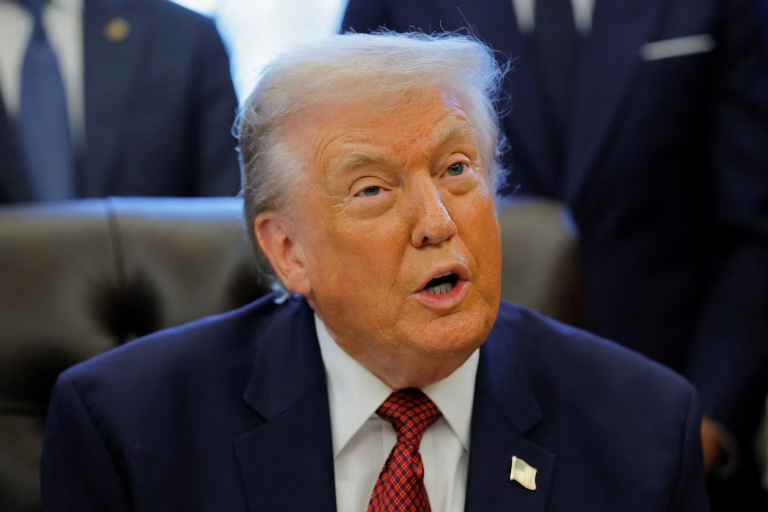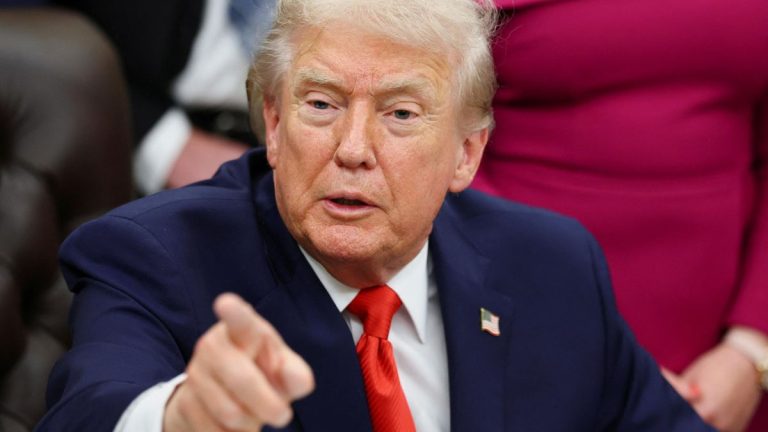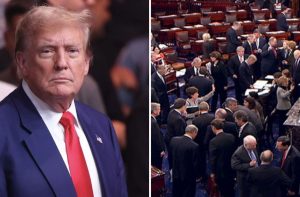WASHINGTON — President Donald Trump’s recent remarks about the possibility of a third term in the White House have reignited a long-simmering constitutional discussion — one that touches the limits of presidential power, the 22nd Amendment, and the boundaries of political ambition in America.
Ten months into his second presidency, Trump, now 79, has not explicitly announced plans to seek another term. Yet his comments in recent interviews, paired with his allies’ open speculation, have prompted fresh debate over whether the U.S. Constitution leaves any room — legal or procedural — for a president to serve more than two terms.
A Controversial Remark Sparks Speculation
In an interview earlier this year, President Trump was asked whether he had considered seeking a third term despite the constitutional prohibition. His response was characteristically open-ended.
“A lot of people want me to do it,” Trump told NBC News in March. “But I basically tell them we have a long way to go — it’s very early in the administration.”
Pressed on whether he would entertain the idea, Trump offered a mix of humor and ambiguity. “I like working,” he said. “I’m not joking. But it’s far too early to think about it.”
Then came the phrase that caught the attention of constitutional scholars: “There are methods you could do it.”
Though Trump did not elaborate, his brief comment set off widespread conversation in Washington and across legal circles about what, if anything, those “methods” might entail.
The 22nd Amendment and Its Limits
The 22nd Amendment, ratified in 1951, was designed to prevent a president from holding office more than twice. It states plainly: “No person shall be elected to the office of the President more than twice.”
The choice of wording — specifically, the use of “elected” — has left some to speculate whether a former two-term president could return to power through other means.
Legal experts, including those at Cornerstone Law Firm, note that the amendment limits only the act of being elected, not necessarily serving. In theory, that distinction could open the door to unusual succession scenarios, though most constitutional scholars agree such moves would face immediate and overwhelming legal challenges.
“The framers of the 22nd Amendment intended to codify the two-term limit set by George Washington and later followed by nearly all presidents,” explained Dr. Elise Cohen, a constitutional law professor at Georgetown University. “But the text’s narrow focus on elections, rather than service, has created an ongoing debate about hypothetical loopholes.”
The “Vice President” Loophole Debate
One of the most discussed — and controversial — theories is the so-called “vice president loophole.” It hinges on whether a twice-elected president could legally become vice president, then ascend to the presidency through the line of succession.
Under the 25th Amendment, if the president dies, resigns, or is removed from office, the vice president “shall become President.”
If a former president were to run as a vice-presidential candidate and subsequently take office after the president’s removal or resignation, it could, in theory, allow a return to power without being “elected” a third time.
Trump himself has addressed this theory directly, telling reporters aboard Air Force One earlier this week that he has no plans to exploit the idea.
“I think people wouldn’t like that,” he said. “It’s too cute. It wouldn’t be right.”
He added, however, that he “would be allowed” to do so — a statement that has drawn further scrutiny.
Other Theoretical Paths Back to Power
Beyond the vice-presidential route, a less discussed possibility lies in a constitutional procedure that has never occurred in modern U.S. history — a House of Representatives selection.
Under the 12th Amendment, if no candidate secures a majority in the Electoral College, the election is thrown to the House, which then chooses the president. Some constitutional commentators argue that a twice-elected president could theoretically be chosen by the House, though such a scenario would almost certainly be contested in court.
The 20th Amendment outlines what happens if a president-elect dies or fails to qualify before inauguration day, while the 25th Amendment provides the line of succession once a president is in office.
While these routes exist on paper, experts emphasize that none have been seriously tested in this context. “These are legal hypotheticals, not practical realities,” said Cohen. “The political and constitutional backlash would be immediate.”
Trump’s Legal and Political Context
Trump’s renewed discussion of term limits comes after one of the most tumultuous campaign cycles in modern U.S. history.
In May 2024, Trump was convicted of falsifying business records related to payments made ahead of the 2016 election — making him the first sitting or former president in American history to be found guilty of a felony.
However, in January 2025, a New York court granted him an unconditional discharge, meaning he avoided prison time, fines, or probation. The decision cleared the way for his return to public office and paved the way for his successful comeback campaign later that year.
Trump also survived two documented assassination attempts during the 2024 campaign, according to Secret Service briefings released earlier this year. Both incidents, though unrelated, prompted tighter security measures around the president and his rallies.
Despite these challenges, Trump secured reelection and began his second term in January — a comeback that his supporters hailed as historic.
Bannon’s Prediction and Party Reactions
Among those stoking the idea of a potential third term is Steve Bannon, Trump’s former chief strategist.
“Trump is gonna be president in ‘28,” Bannon told The Economist recently. “People just need to get accommodated with that. There’s a plan.”
His statement drew a mix of curiosity and criticism, even within Republican circles. Senior GOP lawmakers have largely dismissed the notion, focusing instead on Trump’s current policy agenda.
Meanwhile, Democrats have seized on the comments to warn of what they describe as a dangerous disregard for constitutional limits.
Former Vice President Kamala Harris, who lost to Trump in the 2024 election, told reporters earlier this month that she is “considering another run” and believes “the American people value the rule of law.”
The Legal Consensus: The Bar Is Firm
Despite the renewed attention, legal scholars say the 22nd Amendment remains one of the clearest barriers in U.S. constitutional law.
“There’s virtually no pathway for a third term that wouldn’t provoke a constitutional crisis,” said attorney David Niles, a constitutional litigator based in Washington. “The text might leave theoretical wiggle room, but the intent and precedent are unambiguous.”
No U.S. president has ever served more than two terms since the amendment’s ratification. Franklin D. Roosevelt was the last to break the informal two-term tradition, serving four terms during the Great Depression and World War II.
Congress passed the 22nd Amendment shortly afterward to prevent future presidents from doing the same.
Trump’s Position: “I Like Working”
For now, Trump insists that his focus remains on governance, not reelection maneuvering.
“I like working,” he said in March. “It’s early in the administration. We’ve got a lot of work to do.”
Still, his past remarks and allies’ comments ensure that the question lingers — one that intertwines law, power, and precedent in ways America has rarely confronted.
As the next election cycle approaches, the discussion over whether a president could serve beyond two terms remains a legal curiosity — but one that continues to hover over a presidency already defined by its defiance of convention.

Sarah Mitchell is a bestselling novelist recognized for her insightful and emotionally resonant stories that explore the complexities of human relationships. Originally from Denver, Colorado, Sarah grew up in a family of teachers who nurtured her curiosity and love for storytelling. She studied psychology at Stanford University, where she became fascinated by the intricacies of human behavior—an interest that would later shape her writing career. Sarah’s novels are praised for their nuanced characters, intricate plots, and ability to capture the subtle tensions that define love, friendship, and family ties. Her breakthrough novel, The Spaces Between Us, became an instant bestseller, lauded for its honest portrayal of strained family relationships and the fragile bonds that hold people together. Since then, she has published several works that continue to captivate audiences around the world. Outside of her writing career, Sarah is passionate about mental health advocacy and often partners with organizations to promote awareness and support for those struggling with emotional well-being. Her personal life is quieter—she enjoys hiking in the Colorado mountains, practicing yoga, and spending time with close friends. With each new book, Sarah Mitchell cements her reputation as a writer who illuminates the beauty and struggles of human connection.









